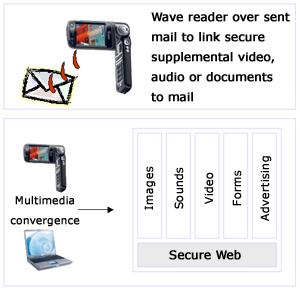Until patents have been proven in court, shouldn't they be used as a defense of a business or application?
When companies wave their patents around, until they have been proven in court, doesn't this stifle innovation?
Last Fall the EFF
asked for help in debunking a barcode patent.
Today they announced they would be officially challenging it.
EFF Challenges Bogus Patent Threatening Consumer Awareness Productsllegitimate Patent Inhibits Innovation in Market for Mobile Information Access
San Francisco - The
Electronic Frontier Foundation (EFF) took aim today at a bogus patent threatening innovative technologies that enhance consumer awareness, requesting a reexamination by the United States Patent and Trademark Office (PTO).
NeoMedia Technologies, Inc., claims to own rights to all systems that provide information over computer networks using database-like lookup procedures that rely on scanned inputs, such as a barcode.
NeoMedia has used these claims not only to threaten and sue innovators in the mobile information space, but also to intimidate projects focused on increasing awareness among consumers about the social and environmental impact of the products they buy. (red print emphasis is mine).
Numerous Physical World Connection (PWC) companies have expressed concern that this company, and their supporters, are doing just that. (my comment separate from the EFF story)
For example, the Consumer Information Lab at the College of Natural Resources at the University of California at Berkeley uses such technology to examine how health, environmental, and social information affects consumers' shopping behavior and decision-making. Were NeoMedia to control the patent rights to this technology, such projects could be severely limited and potentially shut down.
NeoMedia should not be allowed to use this bogus patent to inhibit consumer awareness, education, or research into the impact of information on consumer choice," said EFF Staff Attorney Jason Schultz. "This is the opposite of 'progress,' something the patent laws are supposed to promote."
EFF's reexamination request shows that the functionality covered by NeoMedia's bad patent was repeatedly included as part of prior patent applications from other companies -- demonstrating that the idea of forming a network connection from scanned items was well-known before NeoMedia made its claim. EFF, in conjunction with Paul Grewal and James Czaja of Day Casebeer Madrid & Batchelder, ask the PTO to revoke the patent based on this and other evidence.
For the full NeoMedia patent reexamination request:
http://www.eff.org/patent/wanted/patent.php?p=neomediaCompanies interested in this EFF story might also find this of interest.Who really "owns" the intellectual property in question?
According to NeoMedia's latest
financial filing,On Page 18 ">All Of The Company’s Assets Are Pledged To Secure Certain Debt Obligations, Which The Company Could Fail To Repay
Pursuant to secured convertible debentures, dated as of March 27, 2007, August 24, 2006 and December 29, 2006, in the principal amount of $7,459,000, $5,000,000 and $2,500,000, respectively, issued to Cornell Capital Partners, LP, the Company was required to secure such secured convertible debentures’ repayment with substantially all of its assets. In the event the Company is unable to repay the secured convertible debentures, it could lose all of its assets and be forced to cease its operations. If the Company is found to be in default under the debentures, the full principal amount of the debentures, together with interest and other amounts owing, may become immediately due and payable.
As of December 31, 2006, the Company was in default of a covenant contained in the financing agreements due to the Company’s pending registration statement to register the underlying shares of the convertible instruments not becoming effective by the specified date. (bold print emphasis is mine)
On Page 21
At December 31, 2006 and 2005, approximately 57% and 39%, respectively, of NeoMedia’s total assets used in continuing operations were intangible assets and goodwill, consisting primarily of rights related to NeoMedia’s patents, other intellectual property.
This should develop into an interesting story.
Comments are welcome, but before I get bombarded, note I am not a patent attorney.
In this case, judication appears to rest with the courts.
 I will be pondering from the RFID Journal Conference in Orlando.
I will be pondering from the RFID Journal Conference in Orlando. From Moldova Washington Nationals to deliver tickets to mobile phones
From Moldova Washington Nationals to deliver tickets to mobile phones













 with the ISAN International Agency. The PC and mobile-phone software needed to read the high-capacity bar codes will be available for free.
with the ISAN International Agency. The PC and mobile-phone software needed to read the high-capacity bar codes will be available for free.





.jpg)